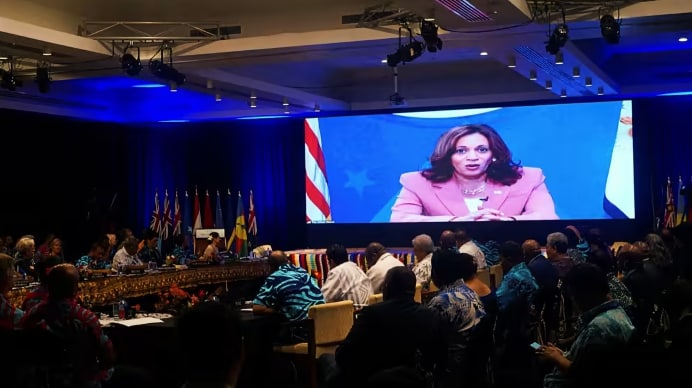Kamala Harris warns island nations against 'bad players’ after promising more aid to region
The US has signed a vital fisheries deal with a group of Pacific islands that will help bolster security ties in Oceania to counter China’s campaign for influence in the region.

US Vice President Kamala Harris addresses the Pacific Islands Forum in Suva via video link Wednesday © Ben McKay/AAP Image
Vice President Kamala Harris appeared via video link at the Pacific Islands Forum in Suva on Wednesday, when she detailed the resumption of diplomatic efforts in the region, as well as $60 million a year in new aid measures, for fisheries and development.
She also called for Pacific island unity as tensions escalate following the Solomon Islands’ decision to sign a security pact with China in April.
“At a time when we see bad players trying to undermine the rules-based order, we must be united,” Harris said in what delegates took as a clear reference to China.
The renewing treaty for tuna fishing in the region was originally signed 32 years ago and was due to expire at the end of the year. The agreement was called unique because it provided the US with a forum to work with the region’s 14 countries on a multilateral basis.
Semi Coroilavesau, Fiji’s Minister of Fisheries and Chairman of the Fisheries Authority of PIF, told the Financial Times that the agreement would allow discussions on additional measures regarding climate change and maritime safety. “This is tuna politics,” he said.
However, the appearance of Harris proved provocative. The PIF demanded that only member nations attend the conference so that leaders could discuss regional issues, including climate change and illegal fishing.
China’s attempt to organize a conference in Suva with the PIF – a month after it failed to sign a region-wide Pacific security pact – was also rejected.
Tess Newton Kane, an analyst at the Griffith Asia Institute think tank, said Harris’ speech would give China’s Foreign Ministry an „open target” to criticize and undermine the PIF at a time when the bloc’s unity was shaken by Kiribati’s departure at the Suva Conference.
“It looks strategically inappropriate,” she said. „Maybe [PIF] wants to send a signal, but that’s not a fully articulated position.”
Despite not being delegates, Chinese embassy staff wearing bula shirts, the traditional outerwear worn by Pacific Islander men, were seen in the main meeting room listening to Harris’ speech.
The resumption of U.S. infiltration into the Pacific has become a hallmark of the Biden administration. Harris said the islands „may not have received the diplomatic attention and support they deserve in recent years.”
Frank Bainimarama, Fiji’s prime minister, described the US proposal, which still needs congressional approval, as a „powerful commitment” to the region.
